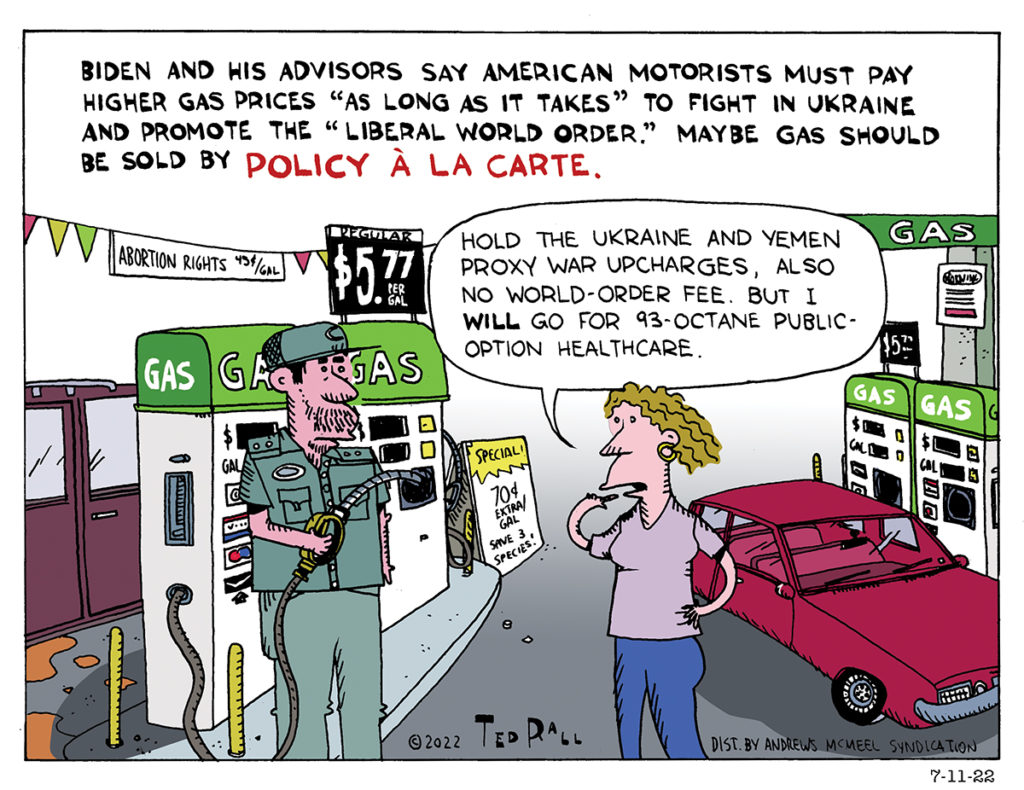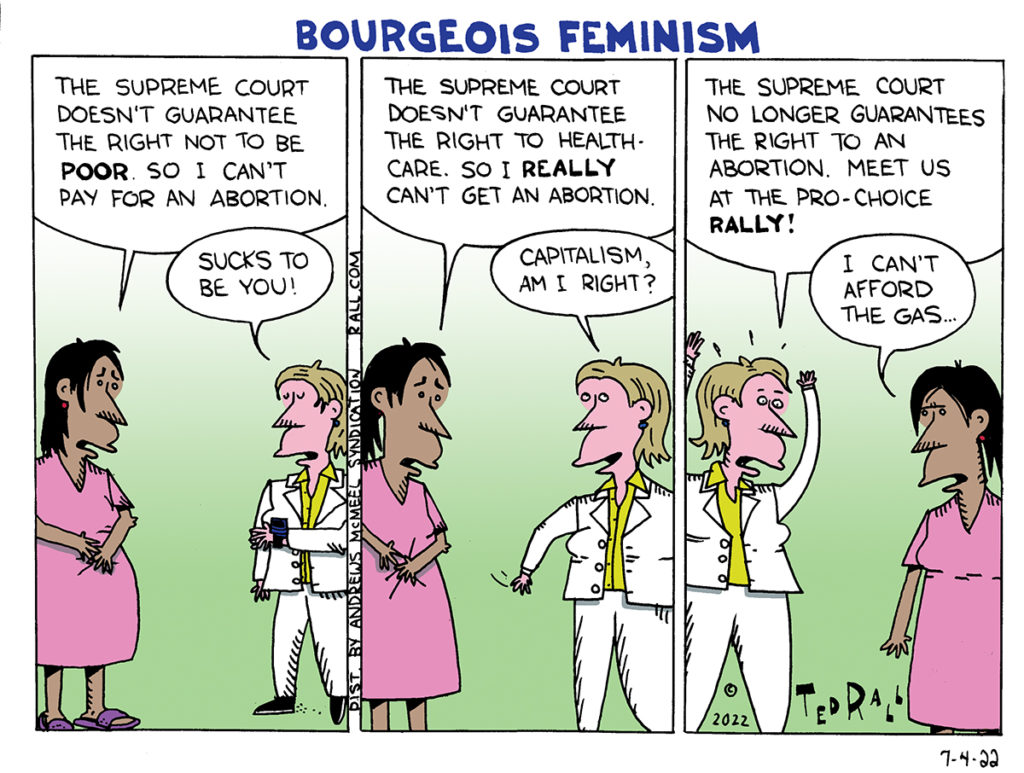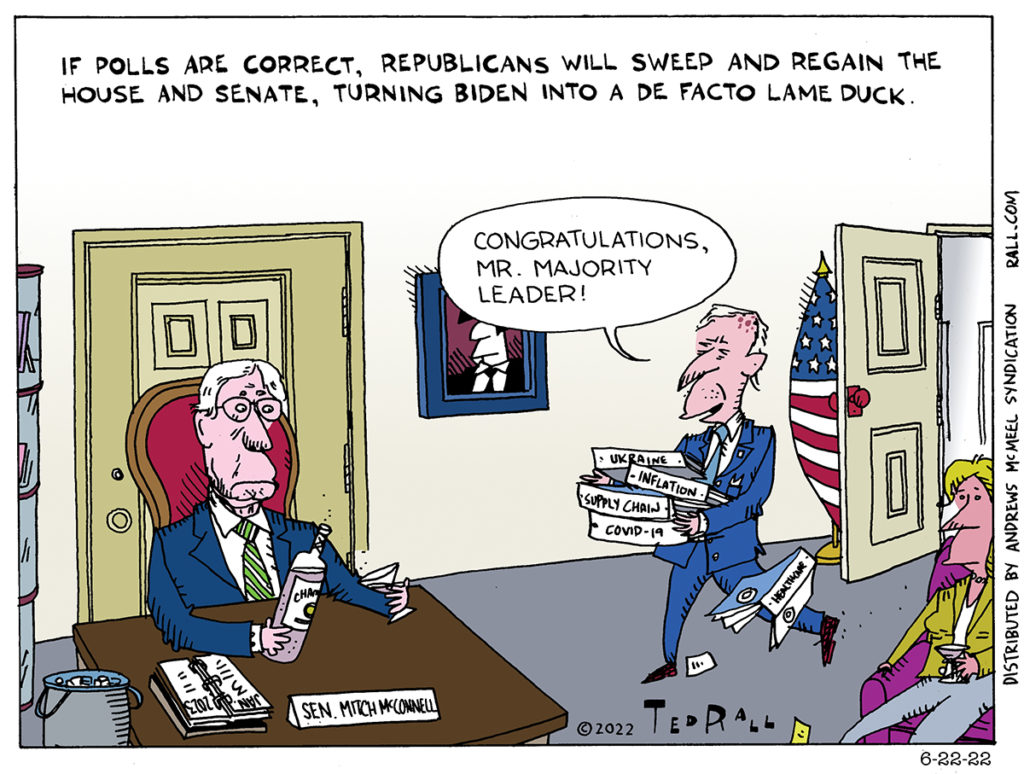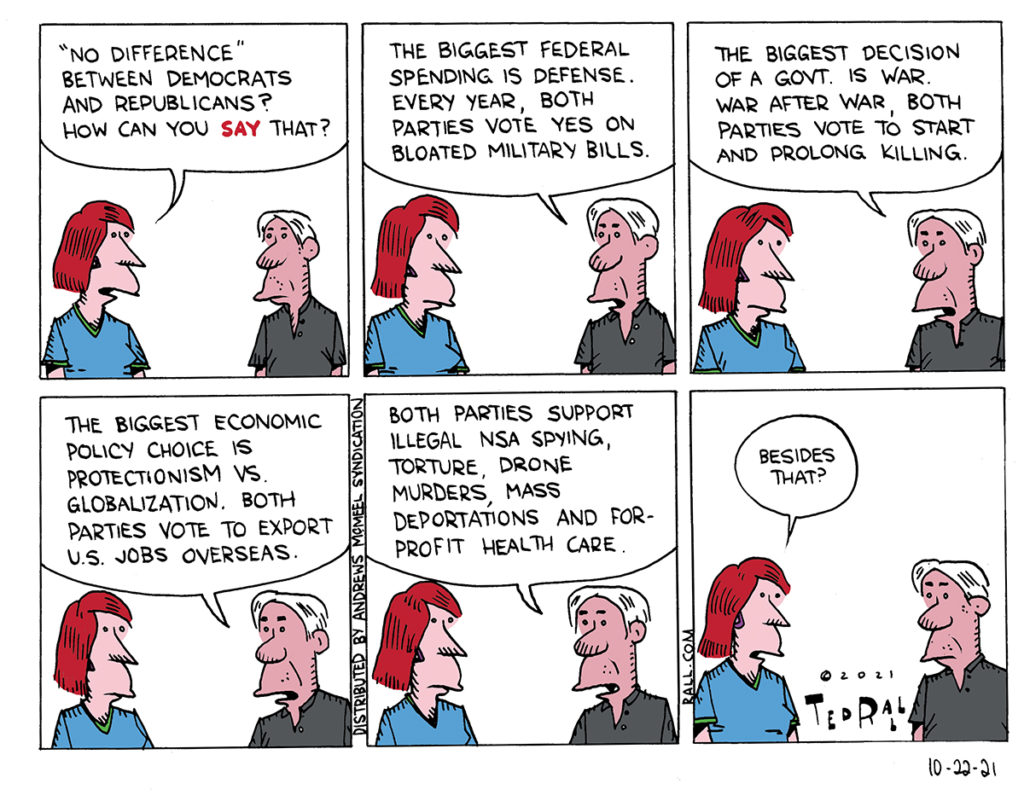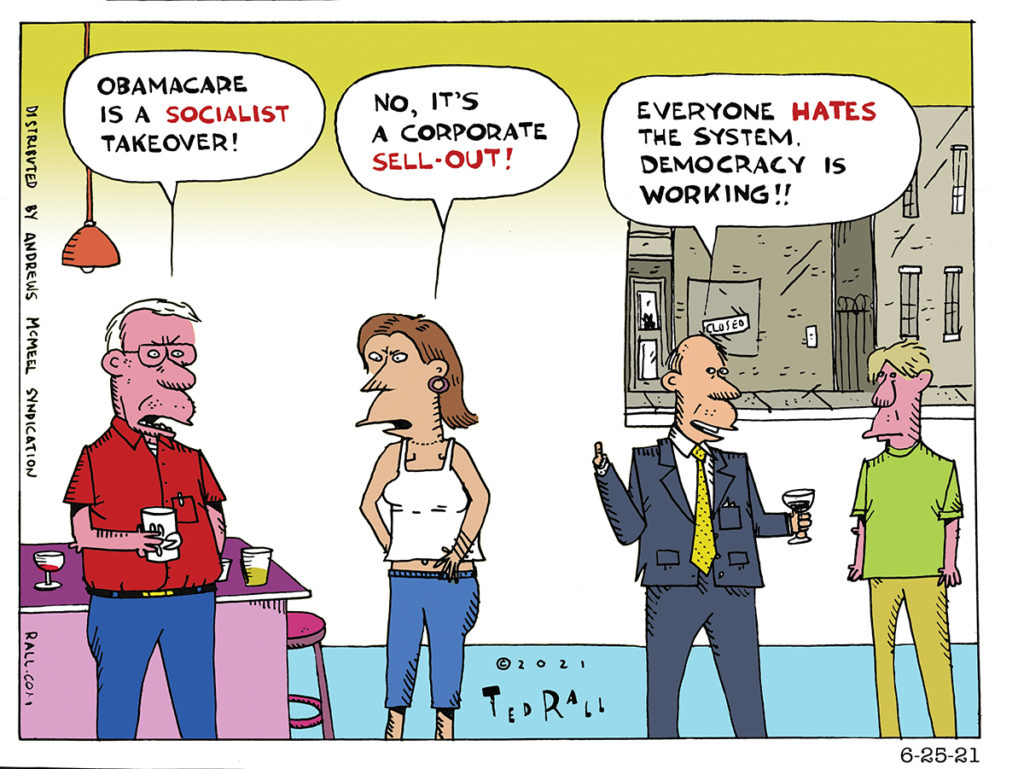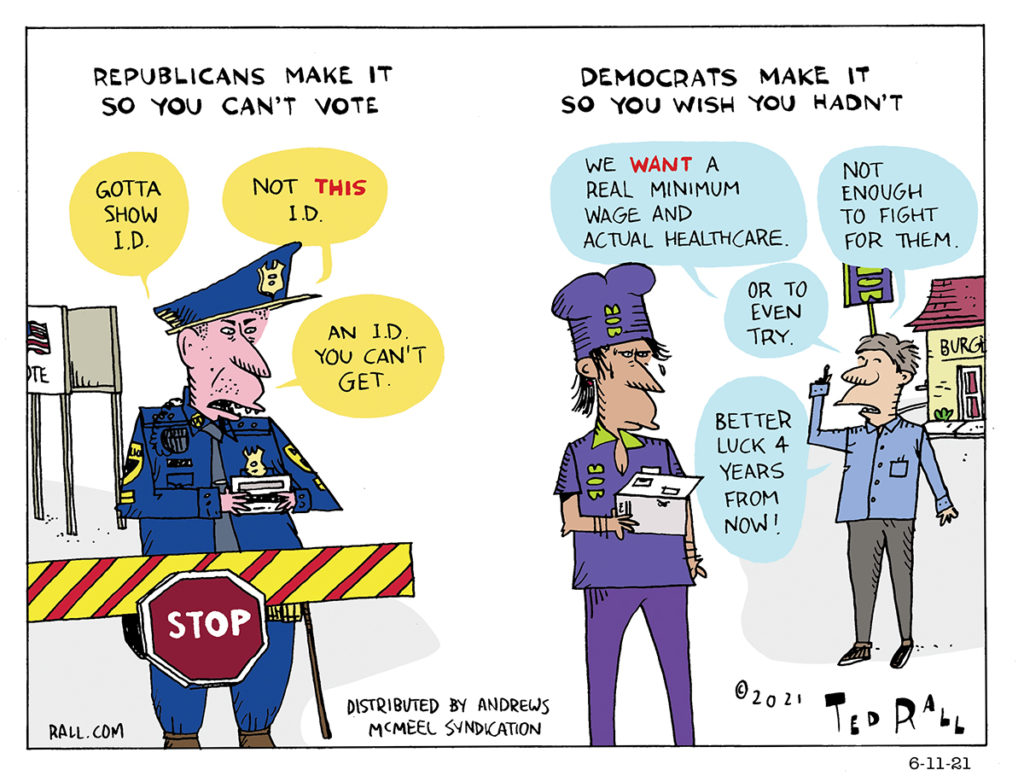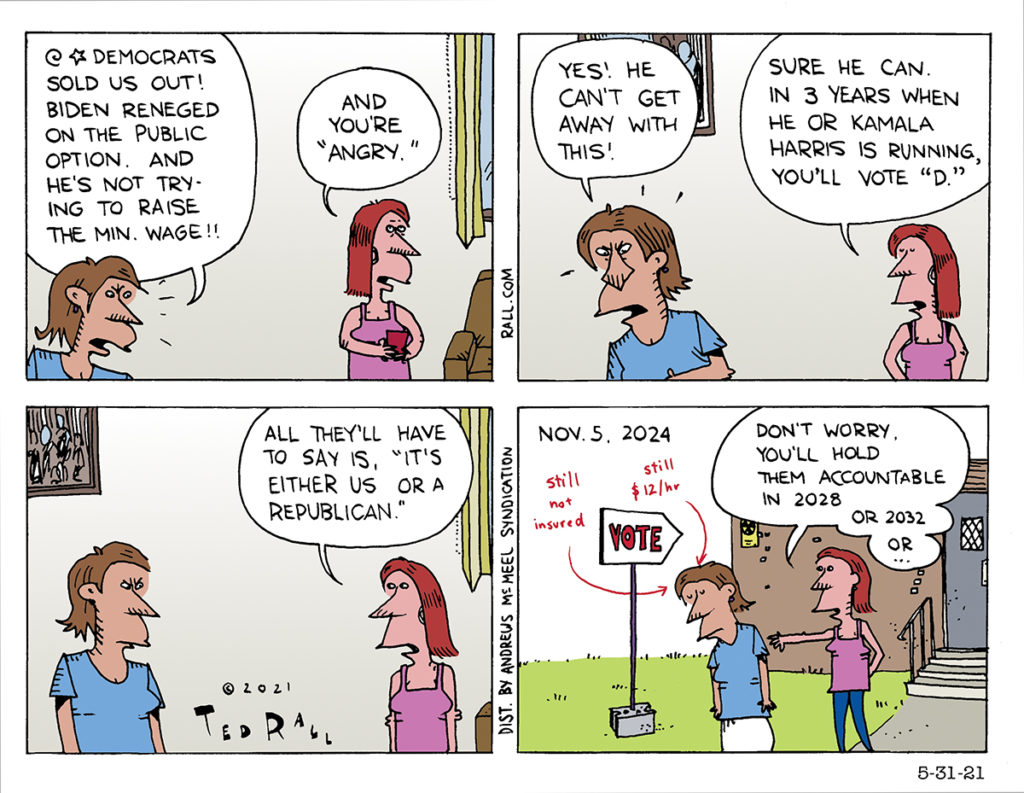President Joe Biden and his advisors tell American motorists that they must pay higher gas prices “as long as it takes” to fight in Ukraine and promote the “liberal world order.” Perhaps gas should be sold by which policies its prices are based upon.
Be Careful What You Mitch for
Polls indicate that Democrats are about to suffer a shellacking in the 2022 midterm elections. Voters are unhappy about inflation, supply chain problems and other issues, but Republicans should be careful what they want — once they are in charge of Congress, they will catch much of the blame for the issues that allowed them to win in the first place.
Better a Pretend Fight Than None at All
 A friend and I were at a bar when someone opined that France didn’t resist the German invasion in 1940. “It’s true, France lost fast,” my friend replied. “But they fought hard. They lost 90,000 troops in six weeks. It was a bloodbath. We lost 58,000 over a decade in Vietnam but we’re still whining about it.”
A friend and I were at a bar when someone opined that France didn’t resist the German invasion in 1940. “It’s true, France lost fast,” my friend replied. “But they fought hard. They lost 90,000 troops in six weeks. It was a bloodbath. We lost 58,000 over a decade in Vietnam but we’re still whining about it.”
Every conflict ends with a winner and a loser. There is no shame in losing—only in not trying.
Democrats need to learn this lesson. Voters want their elected representatives to fight for them.
This administration is not without accomplishments: last year’s coronavirus stimulus package saved millions of Americans from bankruptcy and prevented a recession; though poorly executed, President Biden deserves praise for the withdrawal from Afghanistan; and, inflation aside, workers are benefitting from rising wages and record-low unemployment. The pandemic seems to be in our rearview mirror. Now, The New York Times reports, party bosses are trying to decide on a unified message for the midterms: “Should they pursue ambitious policies that show Democrats are fighters, or is it enough to hope for more modest victories while emphasizing all that the party has passed already?”
Democrats have been bragging about their accomplishments for months. But “Democrats deliver”—their flaccid midterm slogan—hasn’t delivered.
The news that the United States Supreme Court plans to overturn Roe v. Wade may well sweep aside the other issues that have been percolating in voters’ minds over the last few months. But conservatives are just as energized as liberals when it comes to abortion. And many progressives are asking themselves: why didn’t Democrats pass a federal abortion rights law when Obama had a 60-vote supermajority in the Senate? At other times, why didn’t they go on the record with a vote? Abortion repeal probably helps Democrats, but not as much as they think and not enough to keep control of Congress.
Before the Supreme Court leak, Joe Biden’s own pollster was repeatedly warning Democrats that disaster loomed in November. The president’s approval ratings stubbornly refuse to budge above a dismal 40%, hobbled by incredibly shrinking support among voters under age 30. Vegas bookies give the GOP three-to-one odds of recapturing the Senate and a 90% chance of taking back the House. “We haven’t sold the American people what we’ve actually done,” Biden moaned recently.
Messaging isn’t the only problem. “Allies and some voters note that polling is partially driven by anger over extraordinary events, including the war’s impact on gas prices, that the White House could not fully control,” the Times says. Of course, it was Biden’s decision to get involved in Ukraine and to impose sanctions against Russian oil and gas. Gas prices wouldn’t be soaring if Democrats hadn’t gone after Russia. It was an unforced error.
When you control Congress and the White House, and voters are angry at you because they don’t think you have done anything for them, you don’t calm them down by telling them that they are wrong and stupid and that, actually, you have done all sorts of good things for them that they have been too ignorant or ungrateful to recognize. There’s only one way to campaign: tell people that you get it, you understand their pain, and you’re going to fight like hell to make them feel better.
“People can forgive you, even if you can’t get something done,” Nina Turner, a progressive challenging an establishment Democrat for an Ohio congressional seat, argues. “What they don’t like is when you’re not fighting. And we need to see more of a fighting spirit among the Democratic Party.”
For Democrats, however, not fighting – not even going through the motions of pretending they are fighting — is longstanding procedure. House Speaker Nancy Pelosi maintains a strict policy of not putting a measure up for a vote unless she is certain that a Democratic bill will pass. Like other corporate Democrats, she believes a losing vote is a sign of weakness.
Thus the refusal to try to federally legalize abortion rights.
Refusing to hold losing votes in Congress has led to one disappointment after another for progressives. After counting votes in the Senate, President Barack Obama decided in 2010 not to hold a vote on a “public option” in the Affordable Care Act. He blamed recalcitrant Republicans. Without forcing them to oppose this wildly popular idea on the record, however, Republicans could never be held to account in attack ads. (“Congressman Jackson hates people like you. That’s why he voted against health care for your babies!”) Meanwhile, Obama took heat from the left for breaking his campaign promise.
You can argue that you secretly, in your heart of hearts, wanted something that you never put up for a vote. But who will believe you?
Obama betrayed his promise to close Guantánamo for the same reason: he didn’t think he had the votes in the Senate. No one remembers that now. Americans who care about the issue remember that Obama was unwilling to spend political capital to shut down the camp.
Joe Biden’s adherence to Democrats’ count-votes-first practice on his Build Back Better infrastructure plan was more understandable. After conservative Democratic Senator Joe Manchin announced that he wouldn’t support it, the White House pulled the $1.75 trillion bill from Senate consideration because it would have highlighted internal divisions within the party. Sometimes, however, a rogue member of your own caucus must be reined in. If Democrats wanted to show their left-leaning base voters that they were fighters, they would have disciplined Manchin by taking away his committee memberships and held the vote despite inevitable defeat. Then they could have run ads against Republican senators who opposed a giant jobs package.
Democrats have failed to hold votes on increasing the minimum wage to $15 an hour, student loan forgiveness or bold action to mitigate the effects of the climate crisis. While it is true that these ideas might go down to defeat against a united GOP and Democrats in Name Only like Manchin, young voters in particular would like to see them put up for a vote and fought for. And those “nays” could be leveraged against vulnerable Republicans.
Republicans understand the optics of appearing to fight for a cause dear to their voters even if it’s doomed—especially if it’s doomed. Knowing full well they didn’t stand a chance at succeeding, the GOP voted 70 times to repeal Obamacare. After Trump won in 2016, however, they didn’t move to repeal or truncate—because the ACA was popular. “Now that it makes a difference, there seems to not be the majority support that we need to pass legislation that we passed 50 or 60 times over five or six years,” Rep. Mo Brooks of Alabama admitted. Fighting and losing—even pretending to fight only when defeat is assured—gets more results than pointing at your supposed actual accomplishments.
It may well be that corporate Democrats are too beholden to their major donors to, say, increase the minimum wage. Unless the polling changes in a big way, Democrats will have an opportunity to virtue-signal about the minimum wage and student-loan forgiveness the same way the Republicans did on the ACA beginning early next year.
(Ted Rall (Twitter: @tedrall), the political cartoonist, columnist and graphic novelist, is the author of a new graphic novel about a journalist gone bad, “The Stringer.” Order one today. You can support Ted’s hard-hitting political cartoons and columns and see his work first by sponsoring his work on Patreon.)
When It Cares, the U.S. Government Is Extremely Efficient

As the COVID-19 pandemic has made painfully clear, our healthcare system is a disaster. 12% of Americans are uninsured and 21% are underinsured. Many counties have zero or just one healthcare plan on offer through their local ACA marketplace, so there is no price competition whatsoever. Due to the lack of competition, and price gouging, by for-profit insurers, the average family of four who buys insurance through Obamacare pays a whopping $25,000 a year in premiums and deductibles—more than a third of their income after taxes.
More than 18,000 Americans die annually due to lack of medical insurance.
This is very sad, especially for them and their families. But nothing can be done about it. Lame as it is, the Affordable Care Act is as good as it gets. Until the Republicans get back in charge, when they will try to get rid of it again. Political dysfunction, amirite?
When they care about something, however, the U.S. government can be incredibly efficient.
The U.S. government really cares about war.
Just two days after Russia invaded, President Biden signed a memo authorizing the transfer of $350 million of weapons to Ukraine. Within three weeks, almost all the antitank weapons, kamikaze drones and other war materiel had arrived in Ukraine. That’s less time than it takes first-class mail to get to some places within the United States.
If you are sick and uninsured, consider a move to Kyiv. As we saw in Afghanistan, U.S. weapons have a habit of disappearing and being sold for profit in war zones. If you still have enough energy and a little luck, you might be able to pilfer one of those American-made radar systems or a few boxes of grenade launchers to finance your chemotherapy. Even if not, Ukraine offers something the United States probably never will: a universal healthcare system.
Out-of-control college tuition costs have pushed 9 million young borrowers and their families into default on $124 billion in student loans. 80% of these young men and women came from families with total incomes under $40,000; so they’re not deadbeats, they’re poor. The burden of student loan debt hobbles America’s best and brightest just as they are starting out their adult lives. They defer or never purchase homes and cars, and are unable to save for retirement. This hurts the real estate, automobile and durable-goods businesses and turns many talented people into future welfare recipients.
This is highly unfortunate, especially for them and their families. But nothing can be done about it. Lame as it was, President Biden’s campaign promise to cancel $10,000 in student loan debt was as good as could be hoped for. And he never followed through. Responding to pressure from Republicans and right-wing Democrats, Biden’s latest federal budget, for 2022, doesn’t contain any provisions for student loan forgiveness. They said they were too worried about the deficit.
Republicans and right-wing Democrats, on the other hand, only worry about the deficit sometimes. Liberals, conservatives, Democrats, Republicans and every other strain of American House representative and Senator quickly approved an additional $13.6 billion in military aid to Ukraine less than a month after the first shipment of cash. There was strong bipartisan support for the measure, which was immediately signed into law by President Biden. Yay, America!
So don’t despair if you are broke, defaulting on your student loans and unable to escape poverty because even under bankruptcy you can’t get rid of student debt. Scrape up whatever money you still have and hop a plane to Ukraine. Even for non-Ukrainian citizens, total cost of tuition, housing, food, books and other fees at colleges and universities in Ukraine rarely exceed $4000 a year — and they’re usually cheaper. Alternatively, you can try to pass yourself off as Ukrainian at Texas A&M or Hampton University in Virginia, both of which now offer free room, board and tuition to Ukrainian nationals. Americans, of course, need not apply.
One out of six American children, 12 million total, officially live in poverty. Neither political party seems much to care, and child poverty has not been a major campaign issue in decades. So the problem continues to worsen.
This is a total bummer, especially for the kids and their families. But nothing can be done about it. Republicans and right-wing Democrats vote against child tax credits, citing the need to balance the budget and concerns that some parents might not use the money to take care of their kids.
But the budget doesn’t always matter. Nor is careful stewardship of public funds always a priority. When the need is great, both parties come together and overlook such trivialities. President Biden, with the support of Republicans, liberal Democrats and right-wing Democrats, just announced an additional $800 million in military aid to Ukraine, bringing the total to more than $2.5 billion. Who cares if some of that gear winds up in the hands of neo-Nazis? In $100 bills, the cash would weigh 25 tons.
Those who criticize the United States government as inefficient couldn’t possibly be more mistaken. Congress and the White House are lightning quick and incredibly generous—when it matters.
(Ted Rall (Twitter: @tedrall), the political cartoonist, columnist and graphic novelist, is the author of a new graphic novel about a journalist gone bad, “The Stringer.” Order one today. You can support Ted’s hard-hitting political cartoons and columns and see his work first by sponsoring his work on Patreon.)
Corporate Journalists are Blind to a Big COVID Lesson
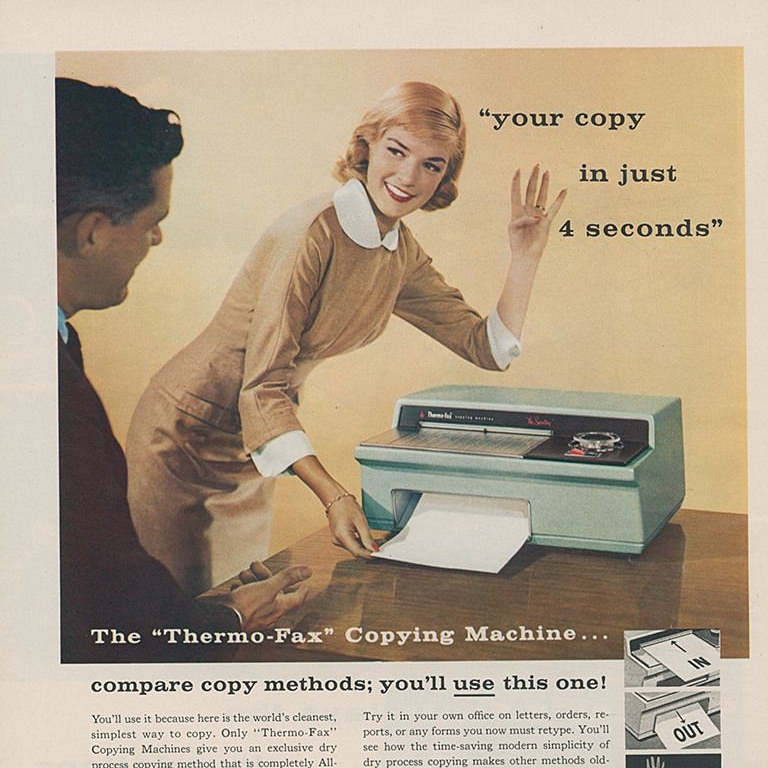
One of my complaints about mainstream media is that they recruit reporters from inside the establishment—Ivy League colleges, expensive graduate journalism programs, rival outlets with similar hiring practices. Some staffs develop admirable levels of gender and racial diversity. But they all come from the same elite class. Rich kids believe in the system and they accept its basic assumptions.
On New Year’s Day a reporter (UPenn and Oxford, of course) published a solid piece for The Washington Post about an important issue, how America’s “fractured healthcare system” hurts our response to COVID-19. Seeking to answer the question of why the pandemic is still going on after the miraculously rapid development and distribution of vaccines, the Post identified organizational shortcomings as part of the problem, citing the need for “improvements on the delivery side.” She quoted an expert who called for “increasing staffing and funding for local health departments, many of which have been running on a shoestring. Officials in some local health departments still transfer data by fax.” Both true. I’ve been asked to fax my records recently.
But.
Nowhere in the Post piece was there any mention of what the United States is missing that most other countries in the world are not: a unified national healthcare system like the United Kingdom’s NHS.
I’m not talking here about fully-socialized medicine or a single-payer Medicare For All system like the one championed by Bernie Sanders, although I strongly believe Americans need and deserve one. This isn’t about who pays for healthcare (though it should obviously be covered 100% by the government).
It’s about data integration.
In the same way that law-enforcement agencies across the country can access criminal records from other jurisdictions via the FBI’s National Data Exchange system, public-health officials need access to a real-time, constantly-updated source of every report of disease whether it’s known or novel, the visit was paid for in cash by the patient or covered by insurance, or it was diagnosed by a country doctor, walk-in urgent-care center or a giant urban hospital system.
A fully-integrated national healthcare database would be a powerful side benefit of a national healthcare system like Medicare For All. But how likely is Bernie Sanders’ pet project to cross the mind of a writer who graduated from UPenn and Oxford and has a gold health insurance plan provided by her employer, who is Jeff Bezos?
Here in America, the nation’s top epidemiologists at the Centers for Disease Control are flying blind, relying on algorithmic models that estimate what’s going on rather than providing accurate, precise situational awareness.
I tested positive for COVID-19 on December 30. I notified my doctor’s office on January 1 but due to the holiday didn’t hear back until January 3. Will New York City authorities and/or the CDC be notified about my case and, if so, when?
Several friends and friends of friends also tested positive during the Omicron surge using home tests. Many, probably most, didn’t tell their doctor. You have to assume that official numbers for Omicron have been significantly underreported.
If we had a national healthcare system instead of a medical Wild West in which the ailing are jostling against each other fighting over $24 testing kits like shoppers rushing into Best Buy on Black Friday, testing would be handled through clinics and doctor’s offices in coordination with the federal government—which would instantly compile the results.
A national healthcare database could include “visualization tools to graphically depict associations between people, places, things, and events either on a link-analysis chart or on a map. For ongoing investigations, the subscription and notification feature automatically notifies analysts if other users are searching for the same criteria or if a new record concerning their investigation is added to the system… [allowing] analysts to work with other analysts across the nation in a collaborative environment that instantly and securely shares pertinent information.”
I lifted that last quote from an FBI description of their police database. Crime, by the way, kills a small fraction of the number of Americans who die from disease.
HIPAA regulations governing patient records would need to be modified by Congress, but consider the potentially lifesaving benefits even when there is no longer a pandemic. Medical errors are the third leading cause of death in the United States.
Decentralized recordkeeping is a public-health disaster. If you live in Wyoming, there is no good reason that your healthcare records shouldn’t be accessible to first responders driving the ambulance that responds to a call that you collapsed and are unconscious at a mall in Florida. As soon as you are identified—something that could be facilitated by a national healthcare ID card that you carry in your wallet or as an app on your smartphone—EMS workers could use your patient history to identify chronic problems. They could avoid a medication to which you might be allergic or feel confident in administering one thanks to the knowledge that you are not.
I didn’t go to UPenn and Oxford. As an independent writer, I pay my own health insurance. I am reminded of America’s crappy healthcare system every time I pay my ACA bill and every time I cough up a co-pay. Newspapers like the Post may or may not need me. But they definitely need people like me if they want to relate to the readers they’re trying to serve.
(Ted Rall (Twitter: @tedrall), the political cartoonist, columnist and graphic novelist, is the author of a new graphic novel about a journalist gone bad, “The Stringer.” Order one today. You can support Ted’s hard-hitting political cartoons and columns and see his work first by sponsoring his work on Patreon.)
Hold Them Accountable in 2040
Once again, Democrats are selling out their progressive voters. This time, Joe Biden says he’s not going to bother trying for a public option on the Affordable Care Act and there’s no sign of any attempt to increase the minimum wage. What will progressive voters do about it? If history serves, probably nothing.

